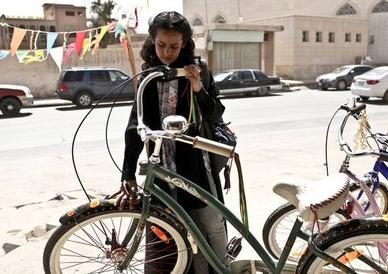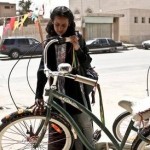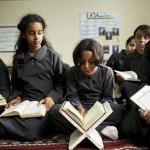Despite Saudi Arabian officials refusal to budge on the rules concerning male-only driving and threatening the arrest of women activists who are planning a protest, repressive laws and customs directed at Saudi women are changing slowly. Women may now ride bicycles, can sit on the national advisory council, and a decision has been made by King Abdullah permitting women to vote and run in municipal elections in 2015. Regardless, it still takes a great deal of courage in Saudi Arabia to stand up to centuries of repressive traditions and assert your full rights as a human being.
Wadjda, funded by European companies and backed by the Sundance Institute, is the first film to be directed by a Saudi woman, Haifaa Al-Mansour, and the first to be shot inside Saudi Arabia. In addition to being genuine and heartwarming, the film is a powerful indictment of the gender inequality that Saudi women face in their lives. For a ten-year-old child with intelligence and an independent streak to be compelled to follow strict religious laws while attending school is quite a challenge. In a sparkling performance by Waad Mohammed, Wadjda is a rebel from the outset. She wears sneakers and shoelace bracelets to school, sells friendship bracelets to her classmates, listens to Western pop music on the radio, and wears baseball boots, much to the chagrin of Ms. Hussa (Ahd), the school’s overbearing principal.
She constantly admonishes Wadjda for not complying with restrictions such as completely covering your face and not being seen in the company of men unless they are a part of your family. Fortunately, Wadjda has a great relationship with her mother (Reem Abdullah) and they treat each other with humor and mutual respect, yet there is tension, mainly created by her father (Sultan Al Assaf) who is in and out of the home, looking for a second wife who can bear him a son. The girl has become friends with Abdullah (Abdullrahman Al Gohani), the next door neighbor of about the same age, who rides a bike and playfully challenges her to beat him in a race.
Their relationship is very sweet and very natural without straining for cuteness and their smiles are enough to put even the grimmest viewer in a good mood. Wadjda is also full of surprises. When she expresses a wish to compete in the annual Koran contest, her authoritarian teacher who is ready to expel students for all kinds of harmless interactions is taken aback. Of course, Wadjda’s reason for entering the contest is to win enough money to purchase the green bike she has her eyes on and which the local store owner is holding for her.
Though girls riding bikes are frowned upon because of the absurd claim that it will keep them from having children, to Wadjda, it is a symbol of her independence from social and religious strictures. Her quest to save money to buy the bike using every street smart she can think shows the strength and quiet determination of her character. Though there are many outstanding performances including Reem Abdullah as Wadjda’s reassuring and sympathetic mother, Waad Mohammed’s dramatization of the plucky ten-year-old with the broad smile helps make Wadjda one of the best films of the year. Unfortunately, since there are no cinemas in Saudi Arabia, it is doubtful whether Saudi’s will ever be able to see it.






'Movie Review: Wadjda (2012)' has no comments